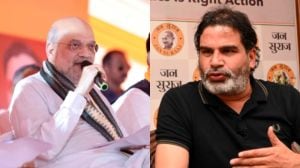Dalmiya takes up Pak issue again after pressure from ICC
Seizing the opportunity of India’s fine victory over Pakistan on March 1 at Centurion, Board of Control for Cricket in India (BCCI) chi...

Seizing the opportunity of India’s fine victory over Pakistan on March 1 at Centurion, Board of Control for Cricket in India (BCCI) chief Jagmohan Dalmiya, has launched a fresh appeal to Sports Minister Vikram Verma requesting the Government of India to have a fresh look at resuming cricketing ties between the two countries.
Dalmiya, who met the minister on his return from Copenhagen today, handed him two letters seeking permission for the resumption of cricketing ties and has cited the pressure applied by the International Cricket Council (ICC) and other members of the ICC as the reason for his doing so.
In his first letter dated March 4, Dalmiya has provided details of what transpired during the ICC executive board members meeting at Johannesburg (March 15-16, 2002) and how the members slammed India’s severing of bilateral cricketing ties with Pakistan.
In his subsequent letter, dated the next day, he also suggested that India be allowed to play against Pakistan at neutral venues. In the first letter, he mentioned how the ECB members, expressing their reservation on India’s ‘‘discriminatory’’ policy regarding Pakistan, wanted to know how the Indian government didn’t have any similar objections when it came to other sports.
The members from New Zealand, in fact, had asked the ICC to slap a heavy penalty against the BCCI. They had even decided that a compensation fund — $ 2 to $5 million — would be established if a tour was cancelled on any grounds other than safety and security, depending on the budgeted profits of the tour.
However, there was some respite for the BCCI when South Africa suggested that the topic could be postponed till the next meeting. They even proposed inviting South African leader Nelson Mandela to mediate between India and Pakistan for resumption of tours. Dalmiya writes: ‘‘All this has necessitated the BCCI to approach the Government of India through your esteemed self to reconsider the stand and allow exchange of cricketing ties between India and Pakistan.’’ In fact, in a recent telecon between the ICC’s board of directors, India was outvoted 1-12 on the issue and all the members, including Pakistan, Sri Lanka and Bangladesh, felt that India’s discriminatory policy has upset the equilibrium in world cricket.
And in the bargain, it was felt, the ICC’s 10-year-schedule of bilateral series — two home and two away — has gone awry. This has, in a way, forced the members demanding total isolation of the BCCI, Dalmiya pointed out.
The ministry had recently refused permission to the Indian contingent for participation in the SAF Games in Islamabad, scheduled for later this month, citing safety and security reasons. And Dalmiya, taking the cue, wrote in his second letter: ‘‘Under the circumstances, for reasons of safety and security, we request you to allow us to play against Pakistan at neutral venues.’’
But there seems to be no let up from the government as far as policies regarding bilateral cricket tournaments go. The ministry, it seems from all accounts, wants to maintain the status quo, even as the ICC executive board is scheduled to meet at Johannesburg on March 23 to discuss the issue.



- 01
- 02
- 03
- 04
- 05




























